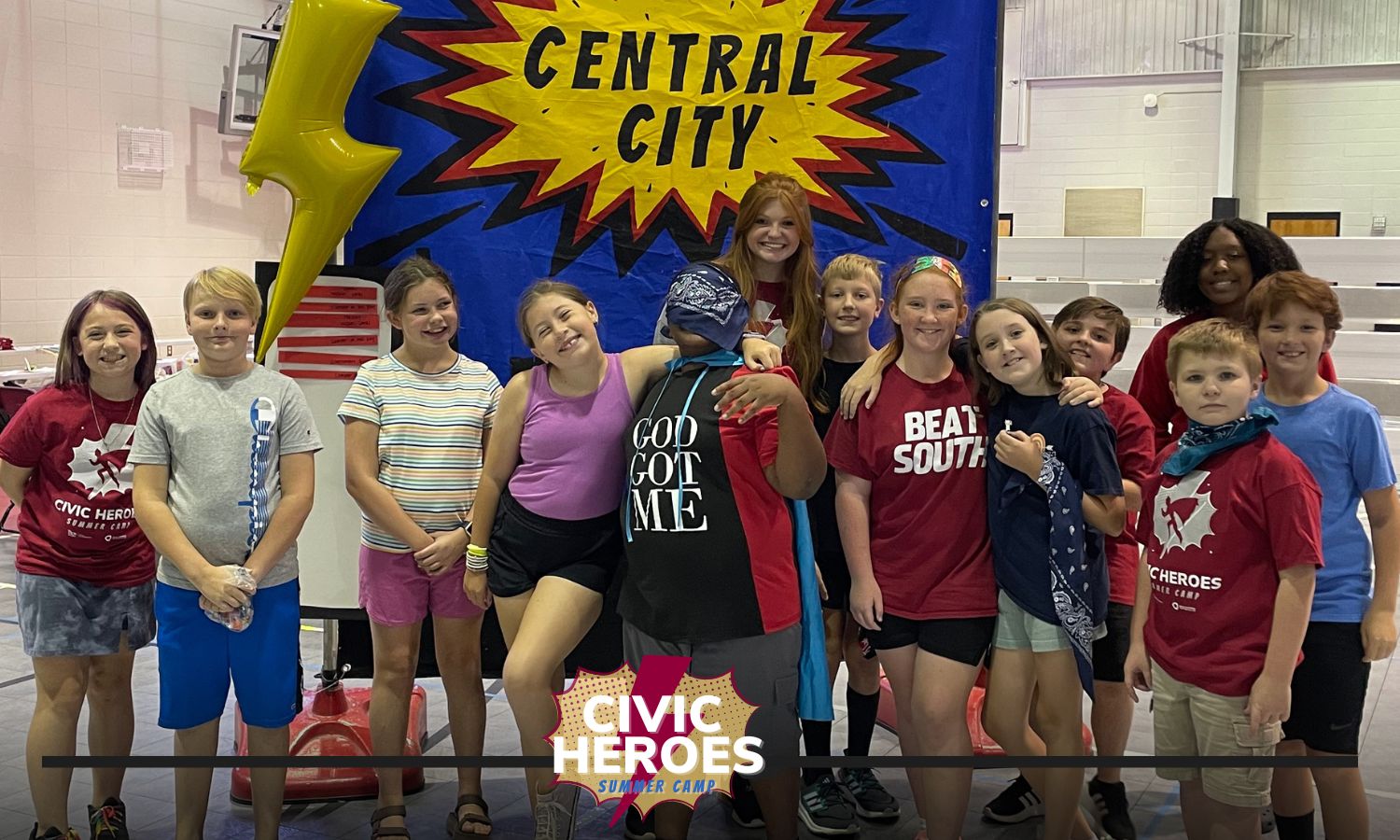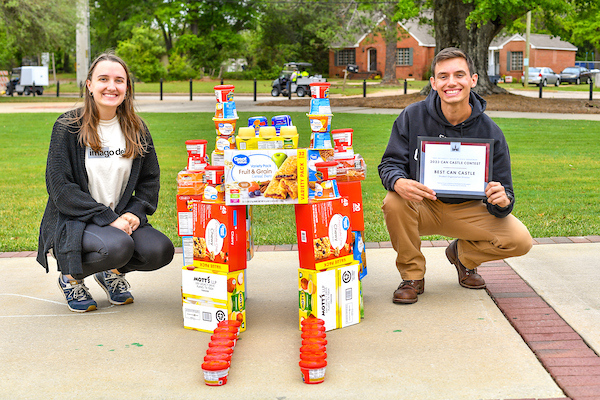Civic Engagement
Our Community, Our Classroom
Learn Through Service
Civic and community engagement is an integral part of every student's college experience. The Office of Civic Engagement provides students opportunities to make a difference in our local community while applying knowledge acquired in the classroom to develop skills in civic action and service. We aim to facilitate quality civic learning experiences that engage TROY students, faculty, and staff with community needs and enhance the academic experience.
Collaboration to Strengthen Community
We believe relationships build community. We see Community Engagement as a collaborative relationship between higher education institutions and their neighbors. Through the Office of Civic Engagement, students work with community partners in education, nonprofit and business sectors to connect to real-world challenges, explore causes, understand needs and work to address public issues. Our goal is to build capacity and work alongside our neighbors to contribute to a strong and resilient community.
Engaging Students On Campus and In the Community
While our campus and community initiatives are focused on addressing local needs, Civic Engagement offers a variety of opportunities for service and engagement. Students can volunteer with Civic Engagement programs based on their interest or availability. Our initiatives center around these public issues:
- Poverty and Hunger
- Youth Development
- Health and Wellness
- Democracy and Active Citizenship
- Sustainability and Environmental Stewardship
Throughout the academic year, students can volunteer weekly as a civic scholar through one of our five core initiatives or attend a single event at any time during the semester as their schedule allows.
EXPLORE VOLUNTEER OPPORTUNITIES
OUR CORE CIVIC ENGAGEMENT INITIATIVES:
Campus Kitchens
Campus Kitchens is an umbrella for all of our programs aimed at addressing food insecurity in our community.
Campus Kitchens captures and reclaims unused, excess food and directs meals to those in need in our local community. Each Thursday, excess food from the dining hall is donated and packaged; on Fridays, packaged food is delivered to youth-serving community agencies.
Backpack for Kids provides backpacks filled with supplemental food for children in need. Food is typically donated by different initiatives or organizations.

Civic Lab and Democracy Project
Civic Lab is a mentoring program hosted in partnership with Charles Henderson Middle School. This program seeks to bring deliberative discussion to middle school classrooms to focus on community inclusion. Civic Scholars participating in the mentoring program must are required to serve for at least one semester. During the academic school year, college students facilitate discussions and mentor students each semester.
The Democracy Project is a campus engagement initiative which focuses on engaging college students through a variety of platforms. These engagement platforms include discussions, film, social media, and opinion polls.

Garden and Nutrition Education
The Community Gardens Program focuses on educating seniors and youth on nutrition education. Civic Engagement has placed several gardens around the city of Troy that generate fresh fruits and vegetables for local children and seniors. This year, gardens at Troy Elementary will be the focus of the Community Gardens Program.

Bright Futures
Bright Futures is a new community partnership through the Office of Civic Engagement that will work increase capacity with a local high school to assist students with college access. Civic Scholars will visit the high school biweekly to discuss future plans and assist with career interest discovery, FAFSA, scholarships, free application week, and more.

Trojan Pantry and Resource Hub
The Trojan Pantry provides food items, personal hygiene products, and other supplies to current Troy University students. The pantry is located at Trojan Village 200 and is open twice a week for visitors and volunteers to organize and inventory donations.

Civic Heroes Summer Camp
Civic Engagement hosts a week-long summer camp for 3rd-5th grade students each July. Campers learn the basics of American government, characteristics of a good citizen and how to be an active part of their community. They have the opportunity to meet and learn from local community heroes each day.
ADDITIONAL SERVICE ACTIVITIES INCLUDE:
- Poverty Simulation
- Offered once each semester
- Days of Service
- In honor of Dr. Martin Luther King Jr. and 9/11 Patriot Day
- Can(less) Castle Contest
- Civic Engagement week with International Engagement Seminar students
- Discussions
- ServeWell
explore volunteer opportunities
CAN CASTLE
Join the fight against hunger.
Each year the Office of Civic Engagement teams up with Student Involvement to host its annual Canless Castle Contest. The food drive brings in more than 5,000 supplemental food items that keep our hunger initiatives well stocked to serve our campus and community for several months.
During the contest, student organizations are encouraged to participate by donating nonperishable food items and come together for a couple of hours to construct their best “castle” using their donations. Castles are critiqued by a judge's panel and recognition is given to the organization who has the best castle design and the organization who donated the most items. There is a student organization division and a greek division. For sororities and fraternities, Greek Week points are also up for grabs.
This fun and engaging activity provides an opportunity for students to be educated on the issue of food insecurity in Pike County and actively participate in addressing this need. The food donations collected this year will go to the Trojan Pantry serving college students, and our Backpack for Kids program (B4K) that serves local youth. Students volunteer weekly with B4K during the fall and spring semesters to pack bags supplemental food items that are delivered to youth in our community. Learn more and sign up here.
If you would like more information you can follow us on Instagram and Facebook.


Interested in participating?
For more information, you may contact Lauren Cochran, Coordinator of Civic Engagement at laurencochran@troy.edu.
Engaging Students In the Classroom
In the classroom is where students acquire the knowledge and skills to best practice and serve in their communities. The Office of Civic Engagement offers interdisciplinary courses in civic engagement that meet Area II and Area IV general studies requirements or count towards a Minor in Civic and Community Engagement.
- IDS 1101 Global Challenges
- IDS 2201 Applications in Public Service
Civic Engagement also partners with a variety of instructors and degree programs to provide co-curricular academic engagement opportunities for students, such as the poverty simulation offered each semester.
Minor in Civic and Community Engagement
Knowledge
- Understand societal and public problems and formulate creative, realistic solutions to these problems
- Identify stakeholders and strategies for engagement in addressing public problems
- Understand theoretical concepts related to community capital, power, voice, and structural inequalities and learn to apply these concepts in practical ways to solve problems
- Understand the importance of inquiry, informed action and effective policy in addressing social problems
- Understand the importance of service, community engagement and informed citizenship to address systemic community issues
- Tie their understanding of community engagement to their career and life plans
Skills
- Demonstrate an ability to engage in respectful, civil dialogue with diverse viewpoints
- Strengthen public leadership and advocacy skills
- Work effectively as members of diverse teams to address community issues
- Demonstrate an understanding of personal values, ethics and responsibility and their impact on personal , professional and civic decisions and actions
- Demonstrate effective research skills to develop feasible solutions to public problems
- Take action on their personal plan for lifelong community engagement and public leadership
Minor in Civic and Community Engagement - 18 hours
Once declaring the minor, students must submit a course plan for approval to the advisor in the Office of Civic Engagement in Eldridge Hall 122.
Required courses (9 hrs)
IDS 1101 - Global Challenges
Fulfills general studies requirements in Area II or IV
Explore knowledge and skills of globally competent citizenship and public service
to address global challenges faced in the 21st century with special emphasis on localized
application.
IDS 2201 - Applications in Civic Engagement
Fulfills general studies requirements in Area II or IV
An overview of strategies for civic enrichment that engage various forms of community
capital to address defined civic issues.
IDS 4495 - Capstone Experience in Public Service and Civic Engagement
An internship based at a community agency, health care facility, school or government
agency focused on application of student's personal plan for community engagement
and public leadership. (Hour requirements vary depending on term or semester enrolled.)
Selected courses (9 hrs)
After completion of IDS 2201, students must select an additional 9 hours from advisor-approved electives in content areas of focus. At least 6 hours must be 3000 or 4000 level courses.
Students completing the Minor in Public Service and Civic Engagement will build competencies in the following areas:
- Identifying public issues and their causes
- Formulating creative, realistic solutions to various civic issues
- Public leadership and advocacy skills
- Project management and teamwork skills
Complete this form: Request for Official Evaluation/Major Change or visit the records office in Room 135, Adams Administration Building.
In addition, email the Office of Civic Engagement.
For more information contact:
Lauren Cochran | Office of Civic Engagement
122 Eldridge Hall | (334) 808-6349 | laurencochran@troy.edu
Pair the Civic and Community Engagement Minor with Troy University's Peace Corps Prep Certificate.
While not required to be taken together, these course requirements align with one another to provide students with additional hands-on experiences and professional development support through four core competencies:
1. Sector-specific skills
2. Foreign language proficiency
3. Intercultural competence
4. Professional savvy and leadership
Learn more about the Peace Corps Prep Certificate under Academic Programs here.
The Office of Civic Engagement is a department in Troy University's John W. Schmidt Center for Student Success. We have three locations of operations: the Civic Engagement Outreach Center, the Trojan Pantry in Trojan Village 200 and the coordinator's office in Eldridge Hall.




